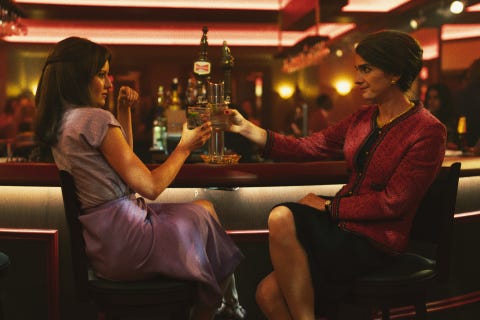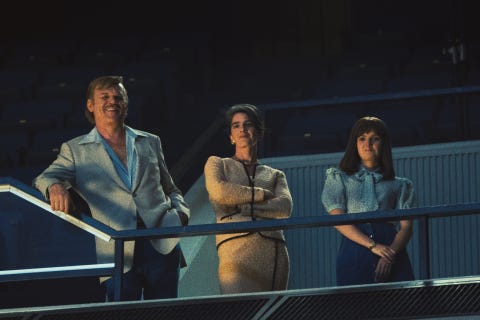Hadley Robinson has never met Jeanie Buss, and certainly not the Jeanie Buss of the ’70s and ’80s, which is when we meet the character in Winning Time, the Adam McKay-led
HBO drama chronicling the rise of the era's Showtime Lakers. But Robinson, the actress behind Winning Time's Jeanie, didn't think she needed to meet the real-life woman to understand her: In Jeanie, she recognized some of her own ferocity. As Moxie and Little Woman actress Robinson put it, the character has “this bubbly personality, but there's something beneath it.” Robinson, who speaks with the intertwining warmth and intensity of an ambitious millennial 20-something, could relate.
Currently the controlling owner and president of the Los Angeles Lakers, Buss has yet to comment about the show on the record. (A 2019 interview with Claire Rothman, former general manager and vice president of the Lakers arena The Forum, suggests Buss wasn't thrilled with the series: “I certainly respected Jeanie, whose opinion it was not to cooperate [with HBO],” she revealed. “And she sent me the script, which they had sent to her. Only the first episode. And she thought I would get a kick out of it.”) While Robinson has no need for praise from the Lakers legend, she nevertheless hopes to do the real woman justice. As a young woman in an overwhelmingly male-dominated front office, led by the likes of her affable but womanizing father Dr. Jerry Buss (John C. Reilly), she stages a slow but steady battle that leads directly to the owner's seat.
“Hopefully,” Robinson says, “she'd see herself as the hero [of the show].”
Ahead, the actress discusses the unique challenge of playing a living person, the powerful but (at times) peculiar relationship between Jeanie and her father, and the future of her involvement in the HBO series.
How much did you know about the Lakers organization before you accepted this job?
I didn't [know anything]. I grew up in Vermont and all we have is skiing, which isn't much fun to watch, in my opinion, so I didn't really grow up around sports. I knew nothing about the NBA and very little about Jeanie Buss; I'd just heard her name. I think I knew the least out of everybody, casting crew included, but it made it fun for everybody else trying to fill me in. I think Jeanie was in a similar position where she wanted to work for her dad. She'd studied business and this was something that interested her, but it wasn't her passion as of yet. She got to learn about it as she went on.

So how did you catch up, as far as research goes? Specifically with Jeanie, where did you begin?
There's so many balls in the air in this role, and I love a challenge, but it really is crazy because you're playing somebody who exists and—on top of that—they're still alive. Then you're also thrown into the ’70s, so you want to take everything into consideration concerning what's going on politically and culturally and how people moved in 1979, how people spoke. So it's not just [playing] a person who exists, but that person subtracting 40 years from their life.
Her parents went through a divorce when she was just 11, and then she dove into work almost immediately. Even at 13, her dad would bring her to meetings and she would sit in. So psychoanalyzing and trying to understand her beneath who she is presentationally—because we do, through interviews, see a very politicized version of her. So, my research mostly had to do with watching interviews, reading articles, getting to know everything she's done, what her full journey has been.
I learned at school that you don't want to fall into the trap of imitation. Because then you just end up watching yourself, and that's not why people go to see TV and movies at the end of the day. So I learned just to [focus on] three things: the big, bright smile, because I think that's a huge part of who she is and what people know her as; how she holds herself and her ticks and how she walks; and—there was one photo of her I saw, and it's of her biting her lip while she's watching a game. And it feels like such an intimate moment where she's just alone in her head. I included that a lot in this first season. It's this watchfulness and perspicacity that she has on the sideline as she's watching everything happen and playing that internal chess game, figuring out what moves she's going to make next.
So much of what we see in the series is her relationship with her father, Dr. Jerry Buss. She idolizes him, sure, but is also in the role of catering to his “needs,” however inappropriate they might be for a teenaged daughter to manage. How did you think about that relationship as you were filming?
[The real-life Jeanie] publicly talks about how much she loves her father on a pretty consistent basis, and I believe it when she says it; you can see the love there. You can really see it. I think the issue early on in their relationship was his relationship to women and booze and power, which were these very masculine traits that he had. She was trying to find a way to have a relationship with her father, flaws and all. I can't even imagine being 14 and having a father who's dating all these young Playboy girls. We included that quite a bit in the show; he has this “more, more, more”mentality, like he was never satiated. I think [Jeanie] saw that and then maybe it reflected in her as, “Oh, maybe I'm never enough either.” Which makes her want to push for her father's acceptance even more. The love is matched with those tumultuous feelings.
Jeanie's already one of the relative few female characters in the series, but she's also one of the few female characters who we see actively battling the sexism around her. A lot of the other women—perhaps they don't want to, but they have to acquiesce, whereas Jeanie is more actively gunning to lead. But even she is forced to acquiesce to her father's baser urges. How did you approach those two conflicting parts of her, keeping in mind how young she was?
Oh gosh. Absolutely, because you're so right—Jessie [Buss, played by Sally Field] and Claire [Rothman, played by Gaby Hoffman]'s characters acquiesce, like you said, because this is normal for them. They've adapted, and they know the ins and outs of how to function in a male-dominated world. And they've not given in, but they've found a way to live within the system. And I think Jeanie—the interesting thing about her as a woman in the show, in her family and in the workplace, is that I don't think she's going to accept that normalcy. She has way too many ideas, she's way too passionate and she's also a part of a new generation of women.
With Jessie and Claire, there are lines where they say, basically, “It's too late for me. I did the best I could do with what I was given as a woman but you can do better.” And they're giving her hints and pieces of advice and secrets as to what they did wrong and where they could have done better. I think Jeanie's just soaking it all up. There are a few scenes that show that sexism, and I'm glad that they're exhibited because it was a huge part of a working girl's life in the ’70s. You see how Claire and Jessie are treated, and I think Jeanie watches and she just says, “It's not going to be that way with me.”

Did you get the chance to talk with the real-life Jeanie?
I didn't. I decided not to reach out, just because I didn't want that initial bias in any way. Maybe one day we'll meet; I'd love to rub shoulders with her. I decided that maybe wasn't the best decision for me because there was so much in the script and the story already, and I had so many resources at hand. I don't know if I could handle meeting the real person.
Playing somebody who is alive—that is such a huge component [of the role's challenge] because you have to stop thinking about what the person themselves will think. That can be terrifying because you want to do that person justice, but you also want to stay true to the story. I think there was some anxiety around that.
[Winning Time] felt different than any project I've done. I felt challenged more, which I really love. And we also shot for so long. I sometimes would really fall into Jeanie and not be able to get out. That was a strange experience, learning to leave somebody behind that you're playing.
What do you think she would think of the show?
[There are] so many different moving parts and pieces that I'm sure she would have separate opinions on. But I feel proud of the work I've done as Jeanie, and I think I do her service because I'm telling this as a hero's journey story. And hopefully she'd see herself as the hero.
I cannot imagine watching a show based on my life, watching something that she lived through when those memories are probably so clear. But I think, if she forgot for a second that it was about something she lived through, and if she considered that [the show is] greatly fictionalized, then I think she could sit back and enjoy it, hopefully.
If this show continues past season 1 in any form, would you want to return?
Absolutely. Because I feel like, in season one, it's establishing relationships and how Jeanie maneuvers a family setting and a work setting. But in season two, I think there's a turning point for her where she really finds her groove. There's just so much more to discover and explore. I want to see parts of the Jeanie we know now really come to the surface.
This interview has been edited and condensed for clarity.
